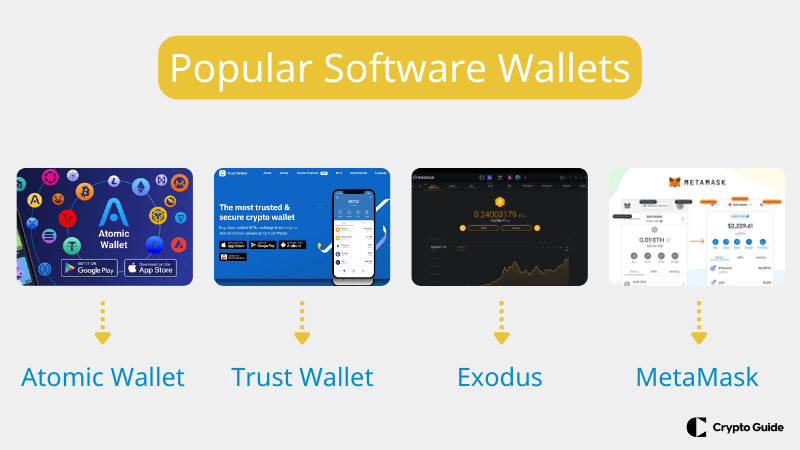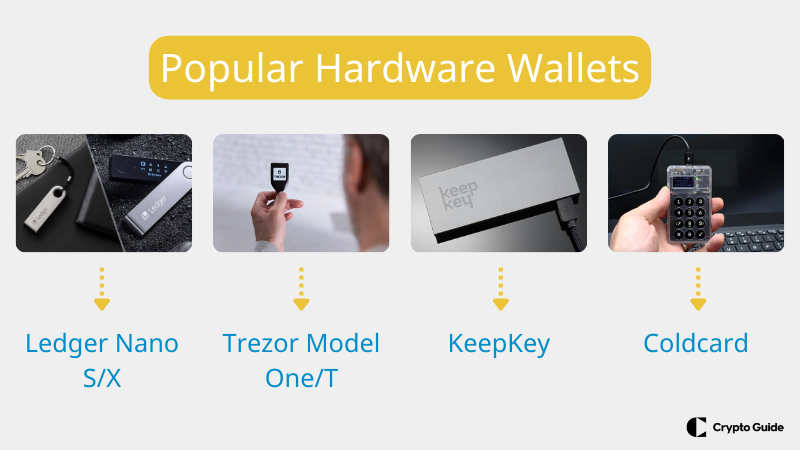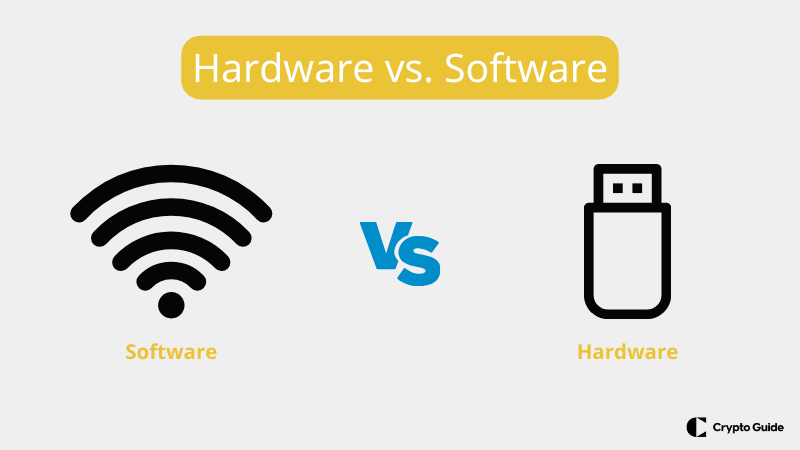Hardware vs. Software Crypto Wallets
This article explains how to keep your cryptocurrency safe by comparing hardware wallets vs software wallets. It helps you understand the differences so you can make a smart choice.
We'll look at their differences, advantages, and limitations to help you pick the right one for your needs, whether you're new to crypto or experienced.
Table of content
What is a Software Crypto Wallet?
A software crypto wallet is a digital application or program that allows you to store, manage, and interact with your digital assets.
It exists entirely as software on your computer or mobile device, unlike physical hardware wallets.
While your actual cryptocurrency lives on the blockchain, the software wallet provides the interface for accessing and managing it.
How Software Wallets Work?
Private keys. The fundamental key to your crypto assets is a private key – a long, complex code that lets you authorize transactions. Software wallets securely store these private keys, allowing you to send and receive cryptocurrency.
User Interface. The software provides a user-friendly interface for interacting with the blockchain by viewing your balances, generating addresses to receive crypto, and sending cryptocurrency to other wallets.
Types of Software Wallets
- Desktop Wallets. These are applications installed directly on your computer.
- Mobile Wallets. These are smartphone apps, that offer convenience for on-the-go crypto management.
- Web Wallets. These are accessible through your web browser.
Examples of Popular Software Wallets

- MetaMask. A popular choice for interacting with Ethereum and other decentralized applications (dApps).
- Exodus. A beginner-friendly wallet supporting various cryptocurrencies.
- Trust Wallet. A mobile wallet focused on simplicity and ease of use.
- Atomic Wallet. Supports many cryptocurrencies and offers staking features.
For more recommendations, check out our list of the best crypto wallets.
What is a Hardware Crypto Wallet?
A hardware crypto wallet is a specialized, physical device that securely stores your cryptocurrency's private keys offline.
It resembles a small USB flash drive and offers superior security compared to software wallets.
Because private keys are stored offline, they're far less vulnerable to hacking or malware attacks.
How do Hardware Wallets work?
- Offline Storage. The most important aspect of a hardware wallet is that your private keys never leave the device. They are generated and stored within the hardware itself, effectively creating an “air-gapped” environment.
- Transaction Signing. To authorize a transaction, you connect the hardware wallet to your computer or smartphone. The transaction is sent to the wallet, where it's digitally signed using the private key. The transaction is then broadcasted to the blockchain without the private key ever being exposed to the internet.
Examples of Popular Hardware Wallets
- Ledger Nano S/X. A popular and affordable option with excellent security features.
- Trezor Model One/T. Another highly regarded hardware wallet with a strong security reputation.
- KeepKey. A device with a larger screen and a focus on simplicity.
- Coldcard. A more advanced Bitcoin-only hardware wallet for highly security-conscious users.

Hardware Wallets vs Software Wallets
| Aspect | Hardware Wallets | Software Wallets |
| Storage | Physical device | Digital device |
| Security | Highly secure, offline storage | Less secure, online storage |
| Accessibility | Requires physical access to the device | Accessible via internet-connected device |
| Password Recovery | Typically not possible, relies on seed phrases | Can usually reset passwords with email or other recovery methods |
| Interface | Often simpler interfaces are managed through device | Varied interfaces, managed through software/app |
| Cost | Higher initial cost | Generally free to download, may incur transaction fees |
Storage
- Hardware Wallets. Store private keys offline on the device itself, offering superior security against online threats.
- Software Wallets. Store private keys on your device (computer, phone) or on a server (web wallets), making them more vulnerable to hacking and malware.
Security
- Hardware Wallets. More secure due to offline storage of private keys and multi-factor authentication for transactions.
- Software Wallets. They are less secure as they store private keys potentially accessible to online threats, although secure password management and encryption can mitigate some risks.
Accessibility
- Hardware Wallets. Less accessible due to the physical device and requirement for connection to a computer or phone for transactions.
- Software Wallets. More accessible as they are readily available on various devices (computers, phones) and may not require additional hardware.
Password Recovery
- Hardware Wallets. Usually rely on seed phrases (a series of words) for recovery in case of lost or damaged devices. Losing the seed phrase can result in permanent loss of access to your funds.
- Software Wallets. Recovery methods vary depending on the wallet. Some offer options like email or linked accounts, while others might require seed phrases or private key backups.
Interface
- Hardware Wallets. Typically have a simpler interface focused on security and transaction signing.
- Software Wallet. Often offers more complex interfaces with features like market data, portfolio management, and exchange integration.
Support for Digital Assets
- Hardware Wallets. May have more limited support for different cryptocurrencies compared to some advanced software wallets.
- Software Wallets. May offer wider support for various cryptocurrencies and tokens.
Cost
- Hardware Wallets. Generally more expensive due to the additional hardware component.
- Software Wallets. Often free or have minimal fees, making them more accessible for beginners.
Choosing between hardware wallets and software wallets depends on your personal needs and priorities. If you value security above all and are okay with some extra cost and inconvenience, a hardware wallet might be your best pick. On the other hand, if you prefer ease of access and lower costs, a software wallet with good security features could be the right choice for you.
Custodial and Non-Custodial Wallets
Crypto wallets can also be split into two further sub-categories: custodial and non-custodial.
Custodial wallets, like Coinbase, Binance, and Bybit, involve a third party managing your private keys. They are user-friendly, offer recovery options, and provide customer support, making them suitable for beginners and active traders. However, you have less control, they are vulnerable to hacks, and face regulatory risks.
Non-custodial wallets, such as Ledger, Trezor, MetaMask, and Exodus, give you full control over your private keys. They offer better security, privacy, and resistance to censorship, making them ideal for long-term holders and advanced users. However, they require you to secure your private keys and can be less user-friendly.
To learn more about the differences between custodial and non-custodial wallets, check out our detailed post on this topic.

Should You Use a Hardware Wallet or a Software Wallet?
Choosing between a hardware and software wallet for your cryptocurrency depends on your individual needs and priorities.
Here's a quick guide to help you choose:
Use a hardware wallet if:
- You plan to store a significant amount of cryptocurrency for a long period.
- Security is your top concern, and you're willing to pay a premium for it.
- You want complete control over your private keys and cryptocurrency holdings.
Use a software wallet if:
- You're a beginner starting with a smaller amount of cryptocurrency.
- You prioritize convenience and accessibility.
- You're comfortable with the increased security risks associated with software wallets and take necessary precautions like strong passwords and multi-factor authentication.
Conclusion: Should You Use Hardware or Software Wallet?
Hardware wallets, with their offline storage and superior security, are ideal for long-term holders, security-conscious users, and those comfortable with a slight trade-off in accessibility and cost. For a deeper understanding of how these wallets work, check out our guide on what is a crypto wallet.
On the other hand, software wallets offer a user-friendly experience and accessibility at the expense of lower security. They are suitable for beginners with smaller holdings, those prioritizing convenience and frequent trading, and users who understand the importance of robust security measures like strong passwords and multi-factor authentication. If you're new to the crypto world, our article on how to choose a crypto wallet provides valuable insights.
The choice boils down to your individual needs and risk tolerance. By carefully considering factors like technical knowledge, frequency of use, and backup strategies, you can select the wallet that best safeguards your valuable cryptocurrency holdings. For those concerned about privacy, look for our top picks of anonymous crypto wallets.
FAQ About Hardware And Software Wallets
What is a hardware and software wallet?
Hardware wallets are physical devices to store cryptocurrencies offline, while software wallets are digital applications that store them on your device.
What are the disadvantages of hardware wallets?
Hardware wallets are less accessible and more expensive than software wallets.
What are the disadvantages of software wallets?
Software wallets are less secure and offer less control over your cryptocurrency than hardware wallets.
What are the 3 different types of software wallets?
The three common types of software wallets are desktop, mobile, and web wallets.
How does hardware wallet protect?
Hardware wallets protect your cryptocurrency by storing your private keys offline, making them inaccessible to hackers.
Should I use more than one hardware wallet?
It depends on your needs but generally, it is more secure to have several hardware wallets.

